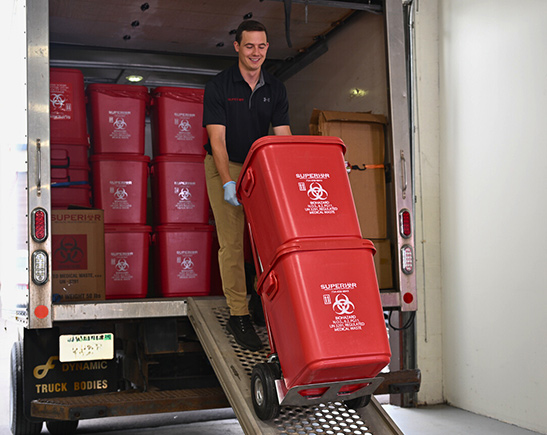Knowledge Unleashed: Understanding the Art of Medical Waste Removal for Health And Wellness Facilities
Knowledge Unleashed: Understanding the Art of Medical Waste Removal for Health And Wellness Facilities
Blog Article
The Value of Appropriate Garbage Disposal Practices
The monitoring of waste is a vital facet of ecological stewardship that frequently goes undetected in our every day lives. Appropriate garbage disposal techniques are not simply a matter of comfort yet are vital for securing our ecosystems and public health and wellness. From the effects of improper waste disposal on our environment to the long-lasting effects for future generations, the importance of embracing sustainable waste management techniques can not be overemphasized. By checking out the environmental impact of irresponsible garbage disposal, the benefits of recycling campaigns, and the relevance of area interaction in waste reduction initiatives, a deeper understanding of why correct garbage disposal methods are essential emerges.
Environmental Influence of Improper Disposal
Inappropriate disposal of waste poses a considerable danger to the setting due to its harmful impacts on environments and human wellness. When waste is not properly managed, it can result in air pollution of the air, soil, and water, triggering damage to different plant and pet types. click here. Chemicals and toxic substances from poorly disposed waste can permeate into the ground, polluting groundwater resources and affecting the health of both wildlife and people
Furthermore, the accumulation of waste in landfills creates greenhouse gases like methane, adding to climate modification and international warming. Inappropriate disposal methods additionally result in littering, which not only deteriorates the visual value of the atmosphere but can also harm wild animals via consumption or complication.
To reduce these ecological impacts, it is vital for neighborhoods and people to adopt appropriate garbage disposal techniques such as recycling, composting, and accountable contaminated materials disposal. By taking these steps, we can help protect communities, preserve all-natural sources, and secure human health and wellness for future and current generations.
Benefits of Recycling Programs
Routinely joining recycling programs provides countless advantages for both the setting and culture in its entirety. One of the key advantages of recycling is the preservation of natural deposits. By reusing products such as paper, steel, glass, and plastic, much less resources require to be removed from the planet, leading to minimized logging, mining, and drilling tasks. This preservation of sources not just aids in maintaining eco-friendly equilibrium yet also adds to sustainable growth.
In addition, recycling plays a crucial duty in reducing power usage and greenhouse gas emissions. The manufacturing of items from recycled products usually requires much less energy compared to manufacturing from virgin resources - medical waste removal near me. As a result, the carbon impact connected with the production process is dramatically decreased, helping in the battle against climate adjustment
Additionally, recycling programs develop work possibilities in the recycling sector, advertising financial growth and social welfare. By urging the recycling and reuse of materials, these programs support a circular economic climate that reduces waste generation and optimizes source performance, eventually resulting in a cleaner, greener future for generations to come.
Hazardous Waste Administration Standards
Implementing reliable unsafe waste management guidelines is essential for lessening environmental and health threats related to the incorrect disposal of harmful materials - click here. Appropriate handling, therapy, and disposal of contaminated materials are important to stop contamination of dirt, water resources, and air
One secret standard appertains labeling of contaminated materials containers to ensure safe handling and transportation. In addition, centers have to comply with rigorous storage space needs to avoid leakages, spills, or mishaps that can jeopardize human wellness and the setting. Routine training programs for workers on contaminated materials administration methods are also important to guarantee compliance with guidelines and advertise a society of security.
Furthermore, contaminated materials needs to be set apart based on its properties to stop chain reactions that might cause hazardous circumstances. Applying a thorough waste radar can help monitor the find this movement of unsafe products from generation to disposal, guaranteeing transparency and responsibility. By adhering to these standards faithfully, markets and companies can add to a much safer and cleaner environment for future and present generations.
Community Participation in Waste Decrease
To properly resolve the ecological and health threats connected with contaminated materials monitoring, involving the neighborhood in waste decrease campaigns is vital. Community involvement plays a vital duty in advertising lasting waste monitoring methods and fostering a society of ecological obligation. By informing locals regarding appropriate waste partition, recycling, and composting strategies, neighborhoods can significantly lower the amount of waste sent out to land fills, thus reducing ecological air pollution and preserving all-natural sources.
Neighborhood involvement in waste decrease programs also helps in elevating recognition regarding the value of waste minimization and motivates individuals to take on green habits in their daily lives - medical waste removal. Collaborative efforts between regional authorities, waste administration business, and community participants can bring about the execution of effective waste reduction strategies tailored to the particular requirements of each community or community
Moreover, neighborhood interaction cultivates a feeling of ownership and accountability amongst residents, encouraging them to take proactive actions in the direction of decreasing waste generation and promoting a cleaner, healthier setting for future and present generations. By interacting in the direction of usual waste reduction objectives, neighborhoods can make a considerable impact on minimizing the unfavorable impacts of inappropriate waste disposal practices.

Future of Sustainable Waste Practices
Standard waste disposal techniques, such as landfilling and incineration, are no much longer lasting in the long term due to their substantial ecological effects. Relocating onward, the future of sustainable waste methods lies in accepting a round economic situation approach, where sources are reused, reused, or repurposed to reduce waste generation.
Technical innovations play an essential role in forming the future of lasting waste techniques. Advanced waste sorting and reusing technologies can aid improve the effectiveness of waste administration processes, enabling the healing of important resources from waste streams. Furthermore, the adoption of naturally degradable materials and composting techniques can assist decrease the amount of organic waste finishing up in land fills, thereby mitigating greenhouse gas emissions.
In addition, advertising customer recognition and education and learning on appropriate waste segregation and disposal practices is important for driving behavioral adjustment in the direction of sustainability. By cultivating a society of waste reduction, recycling, and reuse, neighborhoods can jointly add to a cleaner and much healthier atmosphere for future generations.

Verdict
In final thought, appropriate waste disposal techniques are critical for decreasing environmental impact and advertising sustainability. By executing recycling programs, taking care of contaminated materials appropriately, and encouraging community involvement in waste decrease initiatives, we can work in the direction of a cleaner and much healthier environment. It is very important for businesses, people, and governments to focus on lasting waste practices for the future well-being of our world.
.jpg)
From the repercussions of improper waste disposal on our atmosphere to the long-lasting effects for future generations, the significance of adopting lasting waste administration methods can not be overstated. By checking out the ecological effect of reckless waste disposal, the benefits of recycling campaigns, and the significance of area involvement in waste decrease initiatives, a much deeper understanding of why appropriate waste disposal methods are critical emerges.
By informing citizens concerning proper waste segregation, recycling, and composting methods, areas can substantially lower the amount of waste sent out to garbage dumps, thus reducing environmental air pollution and saving all-natural sources. (click here)
Moving ahead, the future of sustainable waste techniques lies in embracing a circular economic climate approach, where resources are recycled, reused, or repurposed to reduce waste generation.
Advanced waste sorting and reusing innovations can aid boost the performance of waste monitoring procedures, permitting for the recuperation of beneficial sources from waste streams.
Report this page